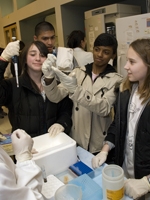Twenty-three teams of student investigators from East Side Middle School-with names like "The Independent Variablezzz," "The Brown-Eyed Perfectionists," and "20/20"-displayed science projects in Olin Hall on March 20 for the Cornell Science Challenge Fair, a community education program sponsored by the Weill Cornell Graduate School of Medical Sciences, Memorial Sloan-Kettering Cancer Center, and The Rockefeller University that trains seventh-graders in the scientific method.
The program pairs two dozen mentors from the participating graduate schools with groups of four to five seventh-graders as they develop an original research project. Over the last 10 years, the program has mentored nearly 1,400 seventh-graders from East Side Middle School in the scientific method: hypotheses, experimentation, and analysis.
"The Cornell Science Challenge program has been trying to enrich these seventh-grade students with hypothesis-driven science experience and expose them to the real working scientists in a top university," said Dr. Xiaoai Chen, who coordinates the program as fellowships and outreach director at the Graduate School.
The seventh-graders choose their hypotheses in January and graduate students guided them toward their research goals over the course of four visits to the middle school.
"The students have taken the lead and they've shown the initiative," said third-year Weill Cornell graduate student Sebastian Shaffer during a morning mentoring session at East Side Middle School. "You can really tell that they are interested in the question." Some of their most common research topics included memory, nutrition and vision.

Seventh-graders from the East Side Middle School learned how scientists use their equipment at Weill Cornell Medical College.
Although Shaffer's group was analyzing data from a successful project, some projects failed to produce data, which in itself can be instructive, said East Side Principal David Getz.
"For some groups, their outcome is not at all what they wanted, or what they expected," said Getz. "Working with scientists, they understand that it's pretty much par for the course and that they're being judged on their science, not on whether their hypothesis was correct. They are learning to think scientifically."
After gathering and analyzing their data, students prepared poster presentations for the Science Challenge Fair at Weill Cornell. The posters covered every aspect of the scientific process, from developing a procedure and providing informed consent to any human research subjects, all the way through to discussing the project's societal significance. During the fair, students gave presentations on their projects and took tours of five Weill Cornell laboratories. Projects were judged by graduate students and winners from the previous year's competition, and were awarded in several categories, including best scientific method, most creative and best presentation.
During the award ceremony, Dr. Randi Silver, associate dean of the Graduate School, encouraged the youngsters to continue on the scientific journey that had just begun.
"You've all done a tremendous effort and you are the future scientists of America," said Dr. Silver. "Does science rock? Yes. Keep doing science."
Photography by Amelia Panico.

